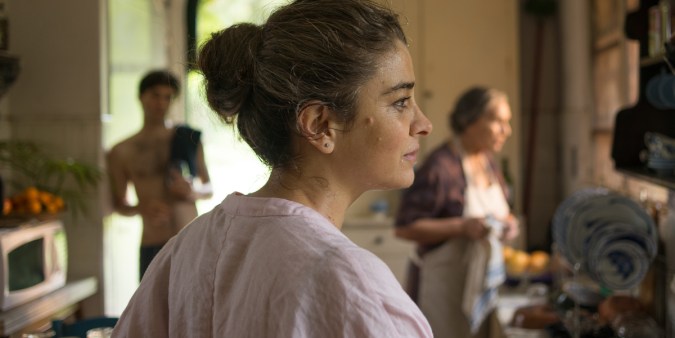Despite taking place in a large country house and its surrounding environs, Paula Hernández’s Los sonámbulos (The Sleepwalkers) is a rather claustrophobic experience. This is by design.
Like its protagonist, Luisa (Érica Rivas), we soon find that while the sprawling vista at her husband’s family cottage looks inviting, it is actually quite insulating – and alienating. It’s why she didn’t want to spend her holidays there to begin with. But ever the accommodating wife and mother, she had relented once her daughter, Ana (Ornella D’elía), insisted they visit her grandmother. As they arrive though, Luisa has every reason to worry: Just the night before, she’d found Ana naked and bleeding as she sleepwalked out of their apartment. Wanting to protect Ana as she grapples with the throes of puberty and what’s apparently a familial affliction (hence the film’s title), Luisa spends much of Los sonámbulos trying to connect with her teenage daughter only to be rebuked. These twinned desires to break free and to find some independence amid an environment that feels ever-encroaching (there are always uncles and cousins and crying babies around) make Hernández’s feature a powerful examination of the way women’s lives are constricted and of the scant opportunities some take to break out.
The steamy, sunny weather feels ripe for enjoyment. Yet Luisa has other things on her mind. There’s Ana, yes. But there are also the secrets she’s keeping from her husband: A consummate translator, she’s been turning down projects to focus on her fiction writing. In between raucous family meals and bustling pool scenes, she steals time to jot down ideas and paragraphs in her notebook. She’s eager to return to being a full-time writer but knows that her husband is more interested in keeping up the status quo, especially as he hopes to persuade his mother of letting him take over the upkeep of the house she’s so keen to sell. With echoes of Lucrecia Martel’s La ciénaga, Los sonámbulos captures the way a family’s own rhythms are hard to penetrate: There’s such lived-in understanding between all these relatives that you understand why Luisa has such a hard time feeling like she belongs.
At one point in the film, while her brother- and sister-in-law are drinking and reminiscing, they come across old photos. Some are cut up, examples of when their mother would crop out ex-girlfriends and old friends she didn’t approve. Luisa jokes she may well be cut out of some family group shots already. During every interaction, she feels like she’s not connecting to anyone. Well, except for the young-but-now-grown-up cousin, Alejo, who’s flirtatious demeanor targets mother and daughter alike. Though Luisa tries to keep her distance, Ana finds herself drawn to Alejo; their electric chemistry letting her act as grown up as she feels. Trapped by the roles these two women are being asked to play, they keep trying to find ways of carving out new spaces for themselves. Writing in bed, making out in the woods, driving aimlessly away from prying eyes, experimenting with lustful thoughts, these are tests to see how far they can be themselves within this hot and steamy holiday. It’s not long until those limits are pushed too far.

Rivas, who’s perhaps best known for her deliciously crazed bride-to-be character from the Oscar-nominated anthology film Wild Tales, channels here some of that same bubbling exasperation. Constantly needled by her mother-in-law and neglected by her husband, who rarely takes her own interests into consideration, her Luisa is a ball of nerves, her eyes always searching for an exit. As Hernández’s hand-held camera follows her, often in long, shaky shots that make us feel like we’re constantly hovering over her shoulder, we see Luisa containing her frustration – with her life, with this holiday, with her chosen family – and wait for it to explode. Which it does. The screaming match that caps off the film follows a particularly disturbing set-piece that involves a shell-shocked Ana and the won’t-take-no-for-an-answer Alejo. Set in the darkened woods and shot from afar, the stillness and darkness that shroud their encounter leave us to imagine the cruelty of what’s happening. But it’s the final straw for Luisa who finally unravels upon understanding what took place, unleashing motherly anger on anyone and everyone around her.
Hernández’s ending is necessarily an uncomfortable watch. That’s what makes it so effective, especially as her camera hastily tries to capture the all-out brawl that breaks out. There’s such a sense of chaos, of a pressure cooker finally exploding, that you feel yourself sigh with relief at Luisa’s outburst. Every scene has led to this and Rivas and her director don’t disappoint, even leaving you with a bitter taste in your mouth as you see two women finally (and together) waking up from what’s been a hazy nightmare they thought they had to sleepwalk through.
Los sonámbulos screened as part of the Toronto International Film Festival




